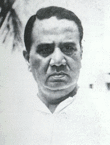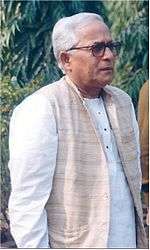List of Chief Ministers of West Bengal
| Chief Minister of West Bengal | |
|---|---|
| Seat | Nabanna, Shibpur, Howrah |
| Appointer | Governor of West Bengal |
| Inaugural holder | Prafulla Chandra Ghosh |
| Formation |
15 August 1947 (as Premier of West Bengal) |
The Chief Minister of West Bengal is the chief executive of the eastern Indian state of West Bengal. As per the Constitution of India, the governor is a state's de jure head, but de facto executive authority rests with the chief minister. Following elections to the West Bengal Legislative Assembly, the state's governor usually invites the party (or coalition) with a majority of seats to form the government. The governor appoints the chief minister, whose council of ministers are collectively responsible to the assembly. Given that he has the confidence of the assembly, the chief minister's term is for five years and is subject to no term limits.[1]
West Bengal origins lie in Bengal, a province of the British Raj that included present-day Bangladesh. Between 1937 and 1947 it was intermittently governed by a popularly elected ministry, whose head is often designated the Premier of Bengal. In 1947, Bengal province was partitioned into the Indian state of West Bengal and East Pakistan. All three erstwhile Bengal premiers—A. K. Fazlul Huq, Khawaja Nazimuddin and H. S. Suhrawardy—became Pakistani citizens; the latter two went on to become Prime Ministers of Pakistan in the 1950s.
Since 1947, there have been eight Chief Ministers of West Bengal. The first was Prafulla Chandra Ghosh of the Indian National Congress, who was succeeded by his party-mates Bidhan Chandra Roy and Prafulla Chandra Sen. A decade of instability followed, marred by fractious coalition governments and frequent impositions of President's rule. The instability ended with 1977 election victory of the Communist Party of India (Marxist) (CPM). Headed by Jyoti Basu, the CPM-led Left Front government was in office for over 23 years (1977–2000), making Basu India's longest-serving chief minister ever. Left rule in West Bengal continued for another 10 years under Buddhadeb Bhattacharya, before its defeat in the 2011 election by the Trinamool Congress. Appointed on 20 May 2011, Trinamool leader Mamata Banerjee is the current incumbent, the state's first woman chief minister.
Colour key for parties
Premiers of Bengal


| No | Name | Took office[2] | Left office | Duration | Election | Party | |
|---|---|---|---|---|---|---|---|
| 1 | A. K. Fazlul Huq[lower-alpha 1] | 1 April 1937 | 1 December 1941 | 5 years, 351 days | 1937 | Krishak Praja Party | |
| 12 December 1941 | 29 March 1943 | ||||||
| 2 | Khawaja Nazimuddin | 29 April 1943 | 31 March 1945 | 2 years, 2 days | All-India Muslim League | ||
| 3 | H. S. Suhrawardy | 23 April 1946 | 14 August 1947 | 1 year, 113 days | 1946 | ||
Chief Ministers of West Bengal




| No[lower-alpha 2] | Name | Took office[4][5] | Left office | Duration | Assembly[6] (election) |
Party[7] (alliance) | |
|---|---|---|---|---|---|---|---|
| Premier of West Bengal | |||||||
| 1 | Prafulla Chandra Ghosh | 15 August 1947 | 22 January 1948 | 160 days | Not yet created | Indian National Congress | |
| 2 | Bidhan Chandra Roy | 23 January 1948 | 25 January 1950 | 2 years, 2 days | |||
| Chief Minister of West Bengal | |||||||
| (2) | Bidhan Chandra Roy | 26 January 1950 | 30 March 1952 | 12 years, 156 days (total: 14 years, 158 days) |
Not yet created | Indian National Congress | |
| 31 March 1952 | 5 April 1957 | First Assembly (1952–57) (January 1952 election) | |||||
| 6 April 1957 | 2 April 1962 | Second Assembly (1957–62) (March 1957 election) | |||||
| 3 April 1962 | 1 July 1962 | Third Assembly (1962–67) (February 1962 election) | |||||
| 3 | Prafulla Chandra Sen[lower-alpha 3] | 1 July 1962 | 28 February 1967 | 4 years, 242 days | |||
| 4 | Ajoy Kumar Mukherjee | 1 March 1967 | 21 November 1967 | 265 days | Fourth Assembly (1967–68) (February 1967 election) |
Bangla Congress (United Front) |
|
| (1) | Prafulla Chandra Ghosh | 21 November 1967 | 19 February 1968 | 90 days (total: 250 days) |
Independent (Progressive Democratic Front) |
||
| – | Vacant[lower-alpha 4] (President's rule) |
20 February 1968 | 25 February 1969 | 1 year, 5 days | Dissolved | N/A | |
| (4) | Ajoy Kumar Mukherjee | 25 February 1969 | 30 July 1970 | 1 year, 155 days | Fifth Assembly (1969–70) (February 1969 election) |
Bangla Congress (United Front) |
|
| – | Vacant[lower-alpha 4] (President's rule) |
30 July 1970 | 2 March 1971 | 215 days | Dissolved | N/A | |
| (4) | Ajoy Kumar Mukherjee | 2 April 1971 | 25 June 1971 | 84 days (total: 2 years, 139 days) |
Sixth Assembly (1971) (March 1971 election) |
Indian National Congress | |
| – | Vacant[lower-alpha 4] (President's rule) |
25 June 1971 | 19 March 1972 | 268 days | Dissolved | N/A | |
| 5 | Siddhartha Shankar Ray | 20 March 1972 | 30 April 1977 | 5 years, 41 days | Seventh Assembly (1972–77) (March 1972 election) |
Indian National Congress | |
| – | Vacant[lower-alpha 4] (President's rule) |
30 April 1977 | 20 June 1977 | 51 days | Dissolved | N/A | |
| 6 | Jyoti Basu | 21 June 1977 | 23 May 1982 | 23 years, 137 days | Eighth Assembly (1977–82) (June 1977 election) |
Communist Party of India (Marxist) (Left Front) |
|
| 24 May 1982 | 29 March 1987 | Ninth Assembly (1982–87) (May 1982 election) | |||||
| 30 March 1987 | 18 June 1991 | Tenth Assembly (1987–91) (March 1987 election) | |||||
| 19 June 1991 | 15 May 1996 | Eleventh Assembly (1991–96) (May 1991 election) | |||||
| 16 May 1996 | 5 November 2000 | Twelfth Assembly (1996–2001) (May 1996 election) | |||||
| 7 | Buddhadeb Bhattacharya | 6 November 2000 | 14 May 2001 | 10 years, 188 days | |||
| 15 May 2001 | 17 May 2006 | Thirteenth Assembly (2001–06) (May 2001 election) | |||||
| 18 May 2006 | 13 May 2011 | Fourteenth Assembly (2006–11) (April–May 2006 election) | |||||
| 8 | Mamata Banerjee | 20 May 2011 | 25 May 2016 | 5 years, 202 days | Fifteenth Assembly (2011–16) (April–May 2011 election) |
All India Trinamool Congress | |
| 27 May 2016 | Incumbent | Sixteenth Assembly (2016–21) (April–May 2016 election) | |||||
See also
Notes
- Footnotes
| Wikimedia Commons has media related to Chief ministers of West Bengal. |
- ↑ During Fazlul Huq's first term (1937–41), his ministry was formed in coalition with the Muslim League. His second government (1941–43), on the other hand, was propped up by eight parties, with the Muslim League in opposition.[3]
- ↑ A number inside brackets indicates that the incumbent has previously held office.
- ↑ During 1–8 July 1962, Sen was acting Chief Minister of West Bengal. He was sworn-in as full-time chief minister on 9 July.
- 1 2 3 4 President's rule may be imposed when the "government in a state is not able to function as per the Constitution", which often happens because no party or coalition has a majority in the assembly. When President's rule is in force in a state, its council of ministers stands dissolved. The office of chief minister thus lies vacant, and the administration is taken over by the governor, who functions on behalf of the central government. At times, the legislative assembly also stands dissolved.[8]
- References
- ↑ Durga Das Basu. Introduction to the Constitution of India. 1960. 20th Edition, 2011 Reprint. pp. 241, 245. LexisNexis Butterworths Wadhwa Nagpur. ISBN 978-81-8038-559-9. Note: although the text talks about Indian state governments in general, it applies for the specific case of West Bengal as well.
- ↑ Premiers of Bengal. West Bengal Legislative Assembly. Retrieved on 12 June 2014.
- ↑ De, Amalendu; Rahim, Enayetur (2012). "Noakhali Sadar Upazila". In Islam, Sirajul; Jamal, Ahmed A. Banglapedia: National Encyclopedia of Bangladesh (Second ed.). Asiatic Society of Bangladesh.
- ↑ List of Chief Ministers of West Bengal (pdf). BanglarMukh. Retrieved on 12 June 2014.
- ↑ Premiers/Chief Ministers of West Bengal. West Bengal Legislative Assembly. Retrieved on 12 June 2014.
- ↑ Brief Information on Previous Assemblies. West Bengal Legislative Assembly. Retrieved on 12 June 2014.
- ↑ Origin and Growth of the West Bengal Legislature. West Bengal Legislative Assembly. Retrieved on 12 June 2014.
- ↑ Amberish K. Diwanji. "A dummy's guide to President's rule". Rediff.com. 15 March 2005.